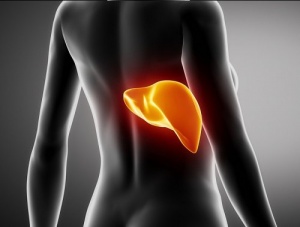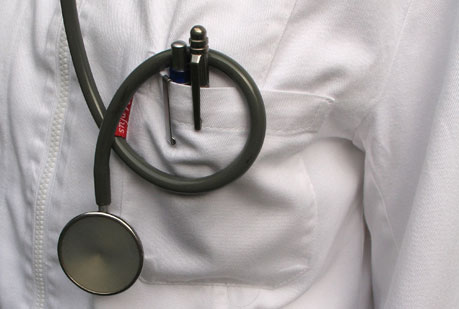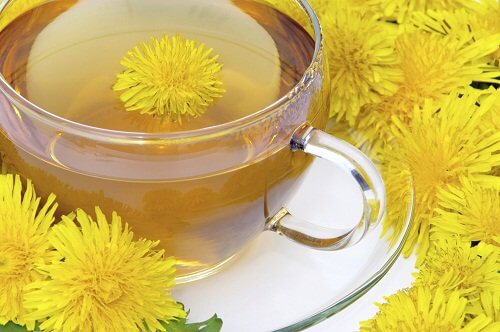Symptoms of an Enlarged Liver and How to Treat It


Written and verified by psychologist Valeria Sabater
An enlarged liver or hepatomegaly is a disease that you shouldn’t ignore. It happens when this indispensable organ suffers an infection and increases in size, thus causing symptoms that you should be aware of. Today, in this article, we’ll be telling you all you need to know about it, for the sake of your health and that of your family. Find out more below.
Why does our liver become enlarged?
As you know, the liver performs basic and essential functions in our body. It synthesizes vitamins, eliminates toxins, filters, purifies harmful elements, and regulates the body’s levels of amino acids and fats.
These are essential tasks to ensure the proper functioning of our bodies, and to help us enjoy a good quality of life. But sometimes, for the simple reason of performing so many processes, something can go wrong, causing damage to this vital organ.
See also: 7 Warning Signs that Your Liver Is Overwhelmed with Toxins
Sometimes there are viruses or bacteria that cause an enlarged liver. Other times it can be due to poor nutrition, excess fats, alcohol, too many processed foods, or by taking many medications which can also cause us to suffer liver enlargement. What, then, are the symptoms?
Symptoms of an enlarged liver

1. Flu-like symptoms
That’s right, during the first days of the inflammation in the liver it is common to feel the same symptoms as if we had the flu. These include very severe fatigue, a slight fever, muscle pain, and nausea. But as time goes on, our prognosis doesn’t improve; on the contrary, we feel worse.
2. Swelling of the abdomen
Being an inflammation, it is common to notice that your belly is more swollen. You will feel pain in the abdomen, and every time you finish eating, you will have a very unpleasant feeling. A feeling of being very full, very heavy and uncomfortable. You may feel nauseous and your digestion will be quite slow.
3. Intestinal Problems
Another fairly common indication of an enlarged liver is a change in the color of your stools. They will be a whiter color. This is directly due to an inflammation caused by a virus. In regards to your urine, doctors tell us that it is common for it to have a darker color.
4. Bad taste in the mouth
Another symptom of an enlarged liver is a metallic or bitter taste in the mouth. You cannot perceive the natural flavors of food and everything suddenly starts to taste unpleasant, thereby taking away your desire to eat. Furthermore, you’ll notice that you have bad breath, a smaller appetite and a dry mouth. These are very characteristic symptoms.
See more: 12 Things That Will Help Prevent Bad Breath
5. Pain and discomfort
In addition to the fatigue that we already discussed, it is common to feel a very uncomfortable pain under the ribs. It is a sensation of having a hot plate around our abdomen. Because of this, you may lose the desire to do things, and feel more tired and sleepy.
6. Skin color
One of the symptoms that should put us on immediate alert is if our skin, or our eyes, suddenly acquire a yellowish tone. This is jaundice and a clear sign that your liver is not well. You should go to see your doctor immediately.
What tests will I have to undergo to know why my liver is enlarged?

In addition to this, he may also ask for an abdominal ultrasound, a test that is neither bothersome nor painful. Finally , you may need to undergo an MRI of the abdomen to obtain a clear diagnosis.
For this test they will need to inject a dye. But don’t worry. As we have said, doctors nowadays have very good treatments available to heal your liver infection.
Tips for treating an inflamed liver

Besides the treatment that doctors prescribe, we can follow some simple guidelines at home that will be of great help to heal your liver. Take note of the following:
- Firstly, eat more fiber, and drink more liquids, natural juices and vegetable smoothies. Avoid red meat, milk, fats and foods with too much salt or chemicals.
- Infusion of milk thistle: few medicinal plants are as good for your liver as milk thistle. It heals, detoxifies, regenerates the cells and reduces inflammation. You can find it in natural food stores, both in tablet form and in tea bags ready for an infusion. Drink it every day to help you feel better.
- Green tea: you already know that green tea is an infusion full of incredible properties for our health. It helps the digestion, is diuretic, anti-inflammatory, rich in antioxidants and well suited to take every afternoon.
- And, finally, dandelion: This is one of the essential plants to detoxify the liver and care for it. It is like a balm that the liver is grateful to receive every day after lunch. This really is a simple remedy that will really benefit your liver.
All cited sources were thoroughly reviewed by our team to ensure their quality, reliability, currency, and validity. The bibliography of this article was considered reliable and of academic or scientific accuracy.
- Senosiaín, M., & Ibáñez, L. (2012). Protocolo diagnóstico de la hepatomegalia. Medicine – Programa de Formación Médica Continuada Acreditado. https://doi.org/10.1016/S0304-5412(12)70372-4
- Pradhan, S. C., & Girish, C. (2006). Hepatoprotective herbal drug, silymarin from experimental pharmacology to clinical medicine. The Indian Journal of Medical Research.
- Qureshi, S., Adil, S., El-Hack, M. E. A., Alagawany, M., & Farag, M. R. (2017). Beneficial uses of dandelion herb (Taraxacum officinale) in poultry nutrition. World’s Poultry Science Journal. https://doi.org/10.1017/S0043933917000459
This text is provided for informational purposes only and does not replace consultation with a professional. If in doubt, consult your specialist.








